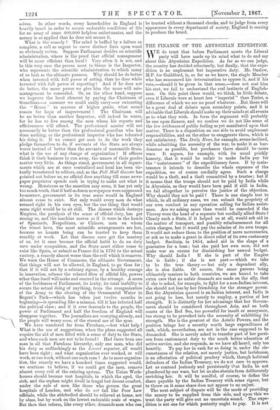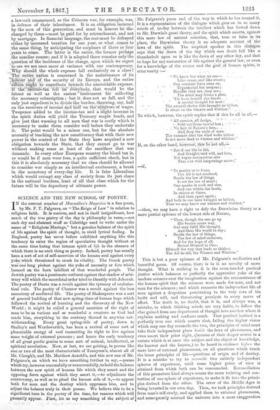THE FINANCE OF THE ABYSSINIAN EXPEDITION.
WE do trust that before Parliament meets the Liberal party will have made up its mind what to do and say about this Abyssinian Expedition. As far as we can judge, the country has decided reluctantly, but finally, that the expe- dition is an unpleasant but imperative duty. Mr. Onslow, M.P. for Guildford, is, so far as we know, the single Member who has announced his determination to oppose it, and if his vote,—should it be given in that sense,—does not cost him his seat, we fail to understand the real instincts of English- men. On this point there would, we think, be little debate, even if Liberals were at heart less " imperial " than Tories, a difference of which-we see no proof whatever. But there will be a great deal of debate upon secondary points, and it is advisable that Liberals should make up their minds at all events as to what they wish. In form the argument will probably be one upon finance, and we confess we do not like some of the few evidences of public feeling as yet manifested upon that matter. There is a disposition on one side to avoid unpleasant responsibilities, and on the other to exaggerate them, which is not satisfactory. The Daily News, for example, seems inclined, while admitting the necessity of the war, to make it as bur- densome as possible, lest perchance there should be more wars. It argues, for example, with its usual prickly honesty, that it would be unfair to make India pay for the " maintenance " of the expeditionary force. If by main- tenance it intends to describe the whole expenses of the expedition, we of course cordially agree. Such a charge would be a theft, and a theft committed by a trustee ; but if it means that the troops should not be paid by India while in Abyssinia, as they would have been paid if still in India, we fail altogether to perceive the justice of the objection. Why should they not be paid There is one simple test to which, in all ordinary cases, we can submit the propriety of our own conduct in any operation calling for Indian assist- ance. Are we asking more than would be conceded if the Viceroy were the head of a separate but cordially allied State ? Clearly such a State, if it helped us at all, would ask aid in the matter of transport, and possibly reimbursement for all extra charges, but it would pay the salaries of its own troops. It would not reduce them to the position of mere mercenaries, or ask us to make a grant in direct relief of its own customary budget. Sardinia, in 1854, asked aid in the shape of a guarantee for a loan ; but she paid her own men, did not make war an excuse for diminishing her annual budget. Why should India ? If she is part of the Empire she is liable ; if she is not part — which we take to be the true theory — but only a dependent ally, she is also liable. Of course, the same persons being ultimately masters in both countries, we are bound to take extra care that no unfair demands are made on the ally, that if she is asked, for example, to fight for a non-Indian interest, she should not lose by her friendship for the stronger power. But the Abyssinian quarrel is an Indian interest, and India is not going to lose, but merely to employ, a portion of her strength. It is distinctly for her advantage that her Govern- ment should be considered throughout Asia, and on both coasts of the Red Sea, too powerful for insult or annoyance, too strong to be provoked into the necessity of exhibiting its strength. She is the greatest of the Asiatic Powers, and the position brings her a security worth large expenditures of cash, which, nevertheless, are not in the case supposed to be demanded. She is merely asked to transfer part of her garri- son from cantonment duty to the much better education of active service, and she responds, as we have all heard, only too heartily. To pay her in cash for so doing is, under the cir- cumstances of the relation, not merely justice, but lavishness, is an affectation of political prudery which, though habitual defenders of the Indian Treasury, we do not care to approve. Let us contend jealously and persistently Oat India be not plundered by our wars, but let us also abstain from deliberately enriching her. It will be needful, of course, to define the share payable by the Indian Treasury with some rigour, but to throw on it some share does not appear to us unjust.
The next subject of dispute will be the mode of providing the money to be supplied from this side, and upon this we trust the party will give out no uncertain sound. The expe- dition is not one for which posterity ought to pay. It is not a law-suit commenced, as the Crimean war, for example, was, in defence of their inheritancfi.. It is an obligation.ineurred by the men of this generation, and must in_ honour be- dis- charged by them—must be paid for by retrenchment, and not by mortgage. In financial language, the cost must be defrayed either by increased taxation for one year, or what comes to the same thing, by anticipating the surpluses of 'three or four . years to come. The latter is the easier, the former perhaps _the manlier course; and if it is adopted there remains only the ,question of the incidence of the charge, upon which we regret to see we are once more at variance with our contemporary. _Why should the whole expense fall exclusively on a class ? .The entire nation is concerned in the maintenance of its honour and of the security of its Envoys, and the entire naionoiltt .to contribute towards the unavoidable expense. If the. i'Mffi'd-ta.x fell 'cin— everybody, that would be the fairest as well as the easiest —instrument fdr collecting the necessary subscription ;—but it does not so fall, and the only just expedient is to divide the .burden, throwing, say, half on the receivers of income a:nd-hal1'on-the:i§0,iVers'of wages. Twopence added to the filer). nie-tax and a slight increase in the spirit duties will yield the Treasury ample funds, and give just that warning to all men that war is costly which is necessary to make them consider well before they undertake it. The point would be a minor one, but for the absolute necessity of teaching the new constituency that with their new power in the control of the State they have acquired a new obligation towards the State, that they cannot go to war without making some at least of the sacrifices that war demands. In every other European country the blood tax is, or would be if men were free, a quite sufficient check, but in this it is absolutely necessary that no class should be allowed to consider war simply as an intellectual excitement, a break
in the monotony of every-day life. It is false Liberalism which would exempt any class of, society from its just share in the national burdens, least of all that class which for the future will be the depository of ultimate power.































 Previous page
Previous page